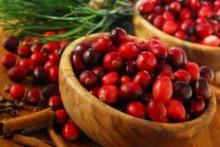Cranberry products appear to protect against urinary tract infections, according to a meta-analysis published in the July 9 Archives of Internal Medicine.
Consuming cranberry in the form of juice seems to be slightly more beneficial than taking capsules or tablets, and ingesting it more than twice per day appears to be slightly more beneficial than taking it less often, said Dr. Chih-Hung Wang of the department of emergency medicine, National Taiwan University Hospital, Taipei, and associates.
The most recent comprehensive review of the extensive literature on cranberry and urinary tract infection (UTI) was a Cochrane analysis published in 2008, which found "a favorable effect of cranberry juice in the prevention of symptomatic UTIs," with a risk ratio (RR) of 0.66. Several studies have been published since then, prompting Dr. Wang and colleagues to perform an updated meta-analysis.
They reviewed the literature for randomized controlled trials that compared cranberry products against a placebo or a control substance and measured the outcome as the incidence of UTI. They identified 13 such studies – 9 parallel-group and 4 crossover trials – for the meta-analysis.
Ten of the studies were North American and 3 were European. The total number of subjects was 1,616.
Unfortunately, "most of the trials did not report their randomization processes adequately and suffered from a high proportion of subjects lost to follow-up (0%-48%)," the investigators wrote.
The studies also varied greatly in the form, dosage, and proanthocyanidin content of the cranberry products tested. Nine trials used cranberry juice and four used capsules or tablets, with daily doses ranging from 0.4 to 194.4 g. Six trials obtained the cranberry products from a single manufacturer (Ocean Spray).
The quantitative analysis excluded three of these randomized controlled trials, pooling the results for 1,494 subjects (794 who received cranberry and 700 who served as controls).
A preliminary analysis showed that cranberry had a nonsignificant preventive effect, but the results were highly heterogeneic. When 1 of these 10 studies was shown to be a significant source of heterogeneity, it also was excluded from the main analysis.
The heterogeneity decreased significantly when this "outlier" study was excluded, resulting in an RR of 0.62, showing that cranberry products appeared to be significantly effective in preventing UTIs.
This finding is very close to that of the previous Cochrane analysis, Dr. Wang and associates said.
In addition, "our sensitivity analyses showed that the protective effect of cranberry-containing products was stronger in nonplacebo-controlled trials, which suggests that expectations of efficacy may have played a role," they said.
Inclusion of the more recent studies enabled the researchers to assess the effect of cranberry products in several subgroups of patients. This revealed that cranberry juice may be more beneficial than tablets or capsules. Subjects who drank cranberry juice may have been better hydrated than those who did not. Alternatively, there may be an additive or synergistic effect of as-yet unknown substances that are in cranberry juice, but not in the other products, the investigators suggested.
Another subgroup analysis indicated that frequent dosing may be more effective than once- or twice-daily dosing. Since previous in vitro studies have reported that "the antiadhesion activity of cranberry juice on fimbriated [Escherichia coli] lasts for approximately 8 hours after ingestion, dosing more frequently than twice daily may be a reasonable choice," they added.
A large study is currently under way to explore optimal dosing strategies, Dr. Wang and colleagues said.
No financial conflicts of interest were reported.


